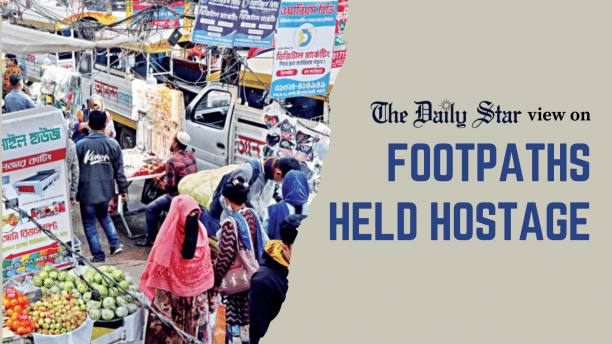Free up our footpaths!

There is no denying that Dhaka is undergoing massive infrastructural changes, some of which—like the metro rail—have dramatically changed the landscapes and lives of those in specific areas of the capital for the better. But, sadly, the more Dhaka changes, the more it remains the same, with the perennial problems of the city now all the more prominent when juxtaposed against these new developments. Take, for instance, the experience of commuters boarding the metro train to reach what would have been a two-hour-long bus ride in 15 minutes—only to spend the next 15 to 20 minutes navigating what ought to be a five-minute walk through the circus that consists of Dhaka's footpaths. From vendors with various goods on their pushcarts to open potholes and overflowing dumpsters, from never-ending work on utility lines to construction materials blocking the way, the footpaths of Dhaka have been held hostage for far too long, failing to provide the basic service it was meant to: allow people to walk in peace.
It is unfortunate that despite being an overcrowded metropolis, we have failed to recognise the role that pedestrian- and gender-friendly footpaths can play to ease commuters' sufferings and make walking in Dhaka a faster and actually enjoyable experience. The government and our urban planners have not prioritised a walkable metropolis in their imagining of Dhaka's present and future, failing to understand that lavish infrastructures alone do not make a city "modern" and liveable. It is high time we find a way to connect the grand structures to the ground realities of the city and to people's lived struggles. Currently, there are 13 agencies across five ministries which have various responsibilities to ensure a pedestrian-friendly environment. But as so often happens in Bangladesh when too many people are in charge, no one really takes any responsibility.
We urge the city corporations to take charge and clear up the footpaths under their respective jurisdictions. Random drives, which we see from time to time, against street vendors are unlikely to bring about long-lasting changes if, in a few days' time, administration-backed nexuses are given leeway to set up shops and extort street vendors again. Urban planners and policymakers need to overhaul how they envision Dhaka. Footpaths may not sound as glamorous as an underground metro route, but a walkable metropolis can be even more of a game-changer for city-dwellers.



 For all latest news, follow The Daily Star's Google News channel.
For all latest news, follow The Daily Star's Google News channel. 

Comments